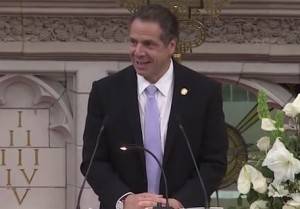 NEW YORK — Gov. Andrew Cuomo has reaffirmed New York’s ban on taxpayer-funded travel to North Carolina. The announcement comes after North Carolina Governor Roy Cooper, Senate President Phil Berger, and House Speaker Tim Moore passed a law — HB 142 — doubling down on many of the worst aspects of the state’s notorious anti-LGBTQ HB2 law.
NEW YORK — Gov. Andrew Cuomo has reaffirmed New York’s ban on taxpayer-funded travel to North Carolina. The announcement comes after North Carolina Governor Roy Cooper, Senate President Phil Berger, and House Speaker Tim Moore passed a law — HB 142 — doubling down on many of the worst aspects of the state’s notorious anti-LGBTQ HB2 law.
“We are grateful for Governor Cuomo’s leadership in reaffirming the state’s travel ban that makes clear just how devastating this anti-LGBTQ legislation in North Carolina truly is,” said JoDee Winterhof, HRC Senior Vice President for Policy and Political Affairs. “His action today protects New Yorkers and prevents taxpayer funds from being spent in a state that fundamentally treats LGBTQ people as second-class citizens.”
“New York has joined a growing list of states and cities who see HB142 for what it really is — a continuation of the deeply discriminatory HB2,” said Equality NC Executive Director Chris Sgro. “We are appreciative of New York Governor Cuomo’s leadership, standing up against the anti-LGBTQ legislation in North Carolina, and showing that HB142 is not the solution. Lawmakers in North Carolina must immediately consider non-discrimination protections for LGBTQ people if they are truly interested in protecting their constituents. It should now be clear to Berger, Moore, and Cooper that they did nothing to repeal HB2, and we will continue to he hurt until they do.”
New York joins an ever-growing chorus of states and cities not fooled by North Carolina’s new anti-LGBTQ law, including Washington; Californ
HB 142 is not an HB2 repeal, and replaces one discriminatory, anti-transgender, bathroom bill with another. It bans local LGBTQ non-discrimination protections statewide through 2020, and it substitutes the previous anti-transgender bathroom provisions with a new provision that forbids state agencies, public universities, primary and secondary schools, and cities from adopting policies ensuring transgender people have access to restrooms consistent with their gender identity.











